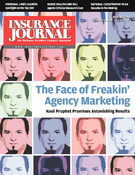Like many other insurance industry groups the Independent Insurance Agents and Brokers of America (IIABA or Big “I”) has found a lot not to like in the healthcare reform bill recently passed by the U.S. House of Representatives. The Big “I” is particularly troubled by the so-called public option portion of the bill, but the tax hikes, a requirement that small businesses offer insurance or pay a penalty, and a grant program to nonprofits so they can provide health insurance counseling have also taken a beating from the agents’ group. (See page N1 for more on the industry’s “official” reaction to the legislation.)
The bill passed the House on Nov. 7 by a 220-215 vote, which included one Republican. According to an analysis by Reuters, among other things, the bill: Creates an insurance market exchange where individuals and small businesses would purchase coverage; creates a new government health insurance plan that would be sold through the exchange; provides for the creation of nonprofit healthcare cooperatives that would sell coverage through the exchange; requires most individuals to purchase health insurance; and bars insurers from excluding people for pre-existing conditions and from charging more based on medical history.
Insurance Journal has posted a number of stories on its Web site, www.insurancejournal. com, about the House bill, following it as it has moved through the legislative process. As might be assumed, most of those choosing to comment on the various postings have generally negative opinions about government involvement in the health insurance industry, or any other line of insurance for that matter. But not all them.
One commenter took the health insurance industry to task for its business practices. By discriminating against those with conditions “beyond their control,” particularly children and the disabled, health insurers have essentially invited government involvement, the commenter argued.
Another said the Big “I” doesn’t represent all agents, and that many agents believe that healthcare reform and a public option are extremely important “to our society and the economic future of America.”
One said real reform should come from the health care industry itself, not insurance, but added that his/her agency sells health insurance only to complement the other lines of coverage, and that the commissions earned from health policies “are a joke.”
Still another pointed to a previous story by Insurance Journal’s Andy Simpson, “Study: Workers’ Compensation Public Options Outperform Private Industry,” posted on the site on Oct. 21, as argument that properly run public/private entities have their place.
Comments like the above are in the minority. Others have gone so far as to call the bill unconstitutional, saying the government has no authority to impose requirement to purchase insurance. (Forgetting, one supposes, that most states require drivers to purchase minimum amounts of auto liability insurance.)
One thing the debate about healthcare reform has certainly done is to underscore a basic tenet of the democratic process: That the citizens of this country are free to express their views on government actions, pro or con, without fear of retribution. And that’s a good thing.
Was this article valuable?
Here are more articles you may enjoy.


 Lawyer for Prominent Texas Law Firm Among Victims ID’d in Maine Plane Crash
Lawyer for Prominent Texas Law Firm Among Victims ID’d in Maine Plane Crash  Florida’s Commercial Clearinghouse Bill Stirring Up Concerns for Brokers, Regulators
Florida’s Commercial Clearinghouse Bill Stirring Up Concerns for Brokers, Regulators  Florida Senate President Says No Major Insurance Changes This Year
Florida Senate President Says No Major Insurance Changes This Year  Insurance Broker Stocks Sink as AI App Sparks Disruption Fears
Insurance Broker Stocks Sink as AI App Sparks Disruption Fears 


